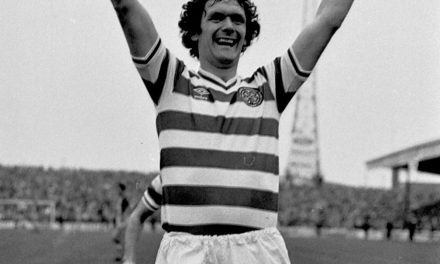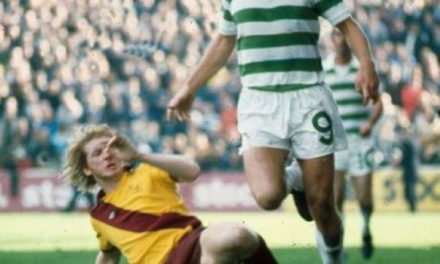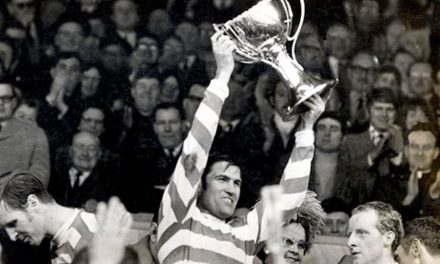Today marks the 43rd anniversary of one of my favourite Celtic games of all time. In an excerpt taken from the book, Ten Men Won The League, we take a look back at a memorable game from 1978. These were still the days of drinking alcohol in the ground and open terracings. A more violent, but very exciting time, when Argentina basked in the title of world champions, John Travolta and Olivia Newton-John had their Summer Nights and Starsky and Hutch were compulsive viewing on Saturday nights…
The first Old Firm fixture of the season was always a highly anticipated affair, but this one was even more keenly awaited than usual. As both clubs had appointed new managers in old adversaries Billy McNeill and John Greig, this ensured it was to be a fascinating confrontation between the two sides who were expected to fight it out for the league title.
Celtic went into the game in fine fettle, following a nine match winning streak in which they had been scoring freely. In comparison, Rangers had yet to win a league game, and looked to be a shadow of the successful side which swept the boards domestically the previous season.
Derek Johnstone, the Rangers star striker who scored forty goals during their treble win, had a disappointing summer. He was unaccountably left out of Scotland’s three games during the 1978 World Cup finals, despite being the country’s most in form striker. This seemed to have an adverse affect on Johnstone, and on his return to Ibrox he demanded a transfer, only relenting when his wish to play in his preferred position of centre-half had been granted.
Many observers found this a strange move on the part of the new Rangers manager. By giving in to Johnstone’s demands, Greig, who had been such an uncompromising player, could be perceived as displaying a sense of weakness, which his predecessor Jock Wallace would never have shown. As it was, Johnstone was fielded at centre-half as he requested. He was also given the Ibrox captaincy as a sweetener for staying at Rangers and declining the advances of several English clubs.
Greig had made two fairly insignificant signings since taking over at Ibrox. Billy Urquhart had joined from the Highland League club, Inverness Caledonian, for a nominal fee. Greig also signed the experienced Scottish international, Alex Forsyth, on loan from Manchester United, to fill the left-back position which Greig himself had vacated.
Rangers had impressed in pre-season by winning the Tennent Caledonian cup tournament, thrashing English first division side Southampton 4-1. Greig encouraged his side to play a more patient, fluent style of football, with Johnstone at centre-half and the capable Derek Parlane in the forward line. However, they then went on to draw two and lose one of their first three league games. Although they were known to be notoriously slow starters, the problem was a lack of goals, with Johnstone’s absence in attack considered to be the main problem.
John Greig could be forgiven for being somewhat distracted as the Celtic game approached. As Scottish champions, Rangers had been drawn against Juventus in the European Cup. Italy had fielded as many as ten ‘Juve’ players at the World Cup finals, and not many observers gave Rangers much of a chance against the Italian champions. Greig would have had the first leg, which was due to be played on the Wednesday after the Parkhead match, firmly on his mind.
The European tie was a mouth watering prospect for Rangers. The Rangers supporters keenly anticipated watching such world class players as Dino Zoff, Gaetano Scirea, Claudio Gentile, Franco Causio and Roberto Bettega. Tickets for the home tie, at a 44,000 reduced capacity at Ibrox, were sold out well in advance. The newspapers reported that Juventus manager, Giovanni Trappatoni, had flown to Glasgow to observe the match with Celtic, during a spying mission of his Scottish opponents.
On the day of the match Celtic were hit with two huge blows, when the experienced duo of Roddy MacDonald and Alfie Conn failed fitness tests. The capable Johannes Edvaldsson would cover for MacDonald at centre-half and young George McCluskey was drafted in to replace Conn in attack. By comparison Rangers were at full strength. Greig fielded Derek Johnstone at number ten, as a dual spearhead strike force with Derek Parlane, in a concerted effort to boost Rangers’ fire power.
The game was a one o’clock kick off, as the authorities made an effort to curb the intake of alcohol before the match. This was intended to cut down potential for the hooliganism and violence which tended to mar this fixture. Heavy drizzle fell in Glasgow that morning and this served to make the pitch slick, creating ideal conditions for fast passing and moving the ball quickly.
Celtic attacked from kick-off, and within seconds McCloy looked unconvincing in keeping out a John Doyle shot. Only ninety seconds had been played when Glavin fired a free-kick deep into the area. Edvaldsson flicked the ball on to Tom McAdam, who fired a fine low shot into the net. The Celtic players celebrated wildly at their early breakthrough, and the Celtic fans packed on the terraces in the 60,000 crowd joined in.
At this point Celtic were clearly on top with their aggressive, pressing style, putting Rangers off their stride. Celtic continued to push forward, and went 2-0 ahead in fourteen minutes when young George McCluskey cut in from the right hand bye line. He sent a low shot at goal, which McCloy unaccountably let skid under him at his front post in the wet conditions.
Celtic went in at half-time fully meriting their two goal lead. However, their players and fans would have been mindful that the team lost 3-2 at Ibrox, exactly a year to the day, after blowing a 2-0 half-time lead. It could be argued that they did not fully recover from the impact of that defeat for the rest of the 1977-78 season. From a psychological viewpoint it was important that they did not buckle under pressure again.
As expected, Rangers came out with all guns blazing in the second half and it was then Celtic’s turn for early nerves. This allowed Parlane the chance to pull a goal back only four minutes after the restart, when he took advantage of defensive hesitancy to score. This was actually Rangers’ first league goal of the season and it gave them a new lease of life. With their midfield in control they drove at Celtic. The Celtic centre-backs Edvaldsson and Aitken coped admirably with the pressure, but just when it looked inevitable that Rangers would equalise, Celtic hit them on the break.
In seventy six minutes a clearance down the Celtic right hand side saw substitute Joe Craig, and Tom Forsyth chase the loose ball. Craig got there first, but Forsyth tried to tackle him in a very clumsy manner. Craig wriggled clear to square the ball for McAdam to score his second and Celtic’s third. It was an unorthodox move by Craig, but one which proved to be highly effective.
Rangers threw on their precocious winger, Davie Cooper, in an attempt to find some inspiration, and as they grew desperate the game deteriorated into a physical encounter. Alex MacDonald was booked after a confrontation with several Celtic players and was withdrawn by John Greig before he could commit any more transgressions. Following this incident, a deluge of bottles and missiles descended from the Rangers end of the stadium, and spectators fled on to the track side for safety before Police resumed order.
With time running out, Rangers made a final assault to save the game. Smith hit the Celtic bar and in the ensuing scramble Edvaldsson handled in the area and Rangers were awarded a penalty. Substitute Alex Miller took the kick, but to the joy of the Celtic fans, Latchford made a brilliant diving save to retain his side’s two goal advantage. The game ended with fierce challenges from players of both sides. At the end of the game five players had been booked but, as the supporters would attest, the most important statistic was that Celtic had won by 3-1.
After the match McNeill was ecstatic at this early boost for his young team. The result gave Celtic an impressive six point lead over their old rivals after only four games played. ‘I think we played all the football in the first half, got caught up a bit in the tension and excitement after the interval, but emerged as good winners.’
For his part Greig lamented the poor start Rangers had made. ‘We lost two goals in the first half and then missed a penalty. In these circumstances you can’t expect to win matches.’
The Sunday Mail commissioned ex-England manager Sir Alf Ramsey to watch the match and give his opinion in ‘The Ramsey Report’. He was scathing of the quality of the game, and said that on this display, both sides would struggle to make an impression in English football. He conveniently chose to disregard the tension that surrounds this fixture and which tends to spoil the games as footballing spectacles.
Ramsey did praise Celtic’s talented midfield duo of Ronnie Glavin and Tommy Burns. He was also complimentary of Rangers’ second half performance, when their passing had improved significantly. Not many fans would have paid much attention to Ramsey’s comments over their Sunday breakfast, as he was never a popular figure north of the border.
For twenty one year old Mike Conroy, who had only arrived at Parkhead the previous March from junior football, this was his first appearance on the big occasion, and he recalls being surprised to play.
‘I was named in the fifteen man squad on the Friday and it was a one o’clock kick-off so I arrived at the ground at quarter to eleven thinking it would be great if I got a place on the bench as a sub. In those days when you came in the door one of the back room staff gave you an envelope with a number on the postage stamp corner which indicated which number you were playing in and my envelope said eight. So I was surprised but overjoyed to be playing.
When I went into the treatment room I saw Alfie Conn lying there and discovered the reason I was playing was that he had failed a fitness test. I was to be in midfield, directly against Alex MacDonald. He was a fine player but was known to be a wee niggly guy on the field. Alfie spoke to me and told me I had to earn MacDonald’s respect by fair means or foul for if I didn’t he would be likely to run all over me. I ran out determined to do this and things went well so it was great advice from Alfie. The game was a blur though and I remember asking the ref how long was left and he said four minutes when I thought there was about twenty minutes remaining.’
Joe Filippi was Celtic’s right-back on the day and he concurs with Conroy. ‘The quickest game of my life’. It flashed by.’
Young Conroy faced his first test and came through with flying colours. He added a bit of steel to the Celtic midfield and the soft underbelly that had been noticeable the previous season looked to have disappeared. Regardless of what would happen during the rest of the season, it was clear that McNeill’s new young Celts would not be found lacking in fighting spirit.
Peter Latchford, whose penalty save had been crucial, remains remarkably modest about his heroic act. ‘The penalty was at the Rangers end and I saved it low to my right. It’s was a long held secret formula I had – it’s what’s called pick a side, shut your eyes and dive. I was just lucky that I guessed correctly.’
Joe Craig, who created Celtic’s third goal, played his last game for Celtic in this fixture. Within a matter of days he signed for Blackburn Rovers for £40,000, as Billy McNeill sought to change his squad and raise money for new players. Craig was an enormously popular player with the Celtic fans. They were sorry to see him leave, although happy that his last game had been such a memorable note to depart on.
Unsurprisingly, the early kick-off did not completely avert the hooliganism for which this fixture was infamous.
‘Violence erupted at the Old Firm clash after Celtic and Rangers players were involved in a confrontation. Terracing fighting also spilled outside Parkhead. A policeman was hurt by a bottle near an exit and fights broke out in the car park. Early estimates by the police put the number of arrests at ‘around one hundred’ with many more being made. The 1pm kick-off aimed at stamping out drunken violence brought chaos to city shoppers caught up in the tides of green and blue which swept through streets leading to bus and railway stations. After the match supporters buses were stoned.’ Evening Times, 9th September 1978.
Police reported that there were one hundred and sixty arrests and seventy people injured in the course of the match. A policeman who was seriously injured after being struck by a bottle. Glasgow’s Lord Provost, David Hodge, felt forced to speak out against the actions of a violent minority, who were not only disgracing the reputations of their clubs, but the reputation of the city itself.
Celtic were then due to travel to the unusual setting of Burnley for an Anglo-Scottish cup tie, and unfortunately the hooliganism which broke out in Glasgow was soon to be seen as product which could be exported.
Celtic – Latchford, Fillipi, Lynch, Aitken, Edvaldsson, Conroy, Doyle, Glavin, McAdam, Burns (Casey), McCluskey (Craig)
Rangers – McCloy Jardine A Forsyth T Forsyth Jackson McDonald (Miller) McLean (Cooper) Russell Parlane Johnstone Smith
Scorers: McAdam 2, McCluskey – Parlane
Attendance: 60,000





